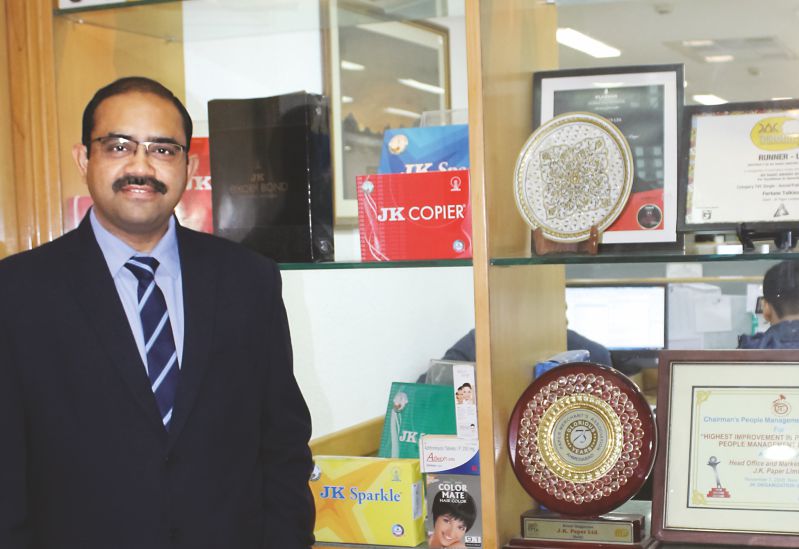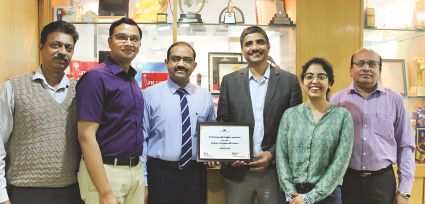“From an employee point of view, the conventional thought process was to get a job and stick to it for as long as circumstances allow. It was not so much about the role and responsibility one was going to share in the organization in accordance with his aspirations of growth. The scenario has changed in this era, where new people are more oriented towards their self-worthiness in an organizational role irrespective of the amount of time they spend in one’s job; changing or staying in a job now is an important aspect of job satisfaction,” says Mr. Anil Dixit, Vice President (HR), JK Paper Ltd.

Paper Mart recently talked to Mr. Dixit on various HR related issues such as employee recruit-ment parameters, rapid transformation in employee skill set altering HR strategies, HR strategies adhering overall business strategy, women participation in the workforce, etc. Interview excerpts :
Paper Mart: JK Paper is one of the largest integrated paper manufacturing entities in India. From human resource management and development viewpoint, what does the company do to effectively manage this vast pool of human resources ensuring the unified work ethic and objectives?
Anil Dixit: JK Paper is a value based legacy organization. It has been able to come through the test of time because of the core values and beliefs, the company practices. One of the key aspects of our organization is the care we show towards our people. The organization’s top-most priority is its employees. If you invest in people, your business will grow. Our emphasis has always been on inculcating the core values in them. JK Paper while hiring, look for employees, who can work in tune with the core values of the organization. What I mean to say, is that, when you slowly integrate all the values of your organization with the people, a cohesive culture takes shape.
We have an open and transparent culture; as a result, the communication flow from top to bottom across various levels and functions within the organization is very high and smooth. We conduct various sessions like communication meetings, departmental meetings, sharing minds to ensure that the company’s vision, strategy, objectives, expectations are effectively communicated down the line and more importantly, there are various avenues in place to receive the feedback and inputs from below as well. The best part of the communication is that it helps in bridging the gap due to which, the work culture and trust grows up.
Besides, we have various other schemes like Kaizen and Suggestion scheme etc. to bring in employee participation. We periodically do employment engagement survey to continuously gauge employee satisfaction, basis which then we get a sense of areas we need to improve upon and accordingly actions are drawn out. That is how we create a culture conducive to the environment for the safe-keeping of people.
PM: Employees are any company’s greatest assets; what are the fundamentals on which JK Paper works to create people/HR development tools and systems in order to form a robust, loyal, ethical, and productive workforce?
AD: As I said, communication holds the key to the creation of efficient employee and work culture. Besides, different expertise and disciplines at factory and company level come together on a specific project/business focus area in cross-functional teams to learn from each other and provide an enriching experience. The goal of such a collaborative teaming is to provide best possible outcomes keeping the objectives of the project in mind. Employee capacity buildings are also carried out through the plant and market visits, in India and overseas, which JK Paper organizes on a periodic basis. These visits provide desirable exposure in enriching knowledge and understanding the best practices being followed across. The officers normally find it easy to communicate, but, it is difficult for the workers to put forth their own issues, hence at the Plant level, there is a proper Grievance Redressal mechanism, especially for our workers. But also, in terms of objectives and driving the performance within the organization, we have a very clearly laid down performance review processes, which is quite transparent and effectively rewarding for our employees, end to end being moderated by senior management.
PM: As the Head-HR at JK Paper, do you think that the company’s HR needs influence strategic planning, and more often leads to a sudden, significant, and visible change in the overall business strategy? What do you do to ensure the HR department’s objectives are aligned with strategic goals?
AD: Our hiring process is very robust having a careful evaluation at every step where we take multiple rounds of the interviews and also do a psychometric analysis of those people to see whether they are the best fit to our organizational structure, competency, work culture, and aspirations. The actual screening process begins thereafter. During our appraisal, we categorize candidates based on their potential in terms of aptitude, skill, and their organizational role. Our fundamental belief is every individual has his own unique proposition & value that he brings in to an organization. Some people will be your future leaders, some will be good performers, and some people will do good operation roles. This is how we focus on employee development and assign right person for the right job.
Within the organization, we have strategic positions that are assigned to the top performing employees, as team leaders. The team leaders in these strategic positions are then supported by a set of carefully selected employees, whose skill set complements the requirement and have requisite competencies. The hierarchical organizational structure is fast fading and a structure where people basically complement and supplement one another is much preferred these days.
PM: To motivate your employees, what kind of things you do to upgrade them to a second level?
AD: It is a very pertinent question because, in today’s time, building bench strength and the leaders for future is a key thing. It is true for every industry. We initiated a particular program at JK Organization a year back from now, in which we worked with Aon Hewitt for redefining our competency framework for the entire organization. After the competency framework was reframed, we did competency assessment of our key senior employees. We are now working on plans for their individual development with the help of numerous activities oriented towards ample action-learning projects apart from their defined roles and responsibilities. These plans will surely help them shoulder higher level of responsibility and further prepare themselves for future leadership roles.

We believe our young employees are our future leaders in the organization. JK Paper has tied up with Thomas Assessments, one of the leading firms in India, to devise similar exercises for our junior level people as well. The methodology is to take them through a learning style wherein 70 percent of the learning will be through action learning projects, 20 percent will be the classroom training, and 10 percent will be the study from books and other texts.
We also nominate our employees regularly for Management Develop-ment Programs (MDP) in top business schools like IIMs, XLRI, ISB, etc.
Lastly, it is important to induct good talent in the organization from the outset. So, we are recruiting from top campuses like IITs, NITs and good B Management Schools as MT’s & GET’s. Once they join, they go through extensive group and business induction wherein they get the opportunity to interact with senior leadership team too.
PM: With the changing face of the manufacturing industry, HR practices have also undergone tremendous refashioning in order to suit the time. What are the most significant changes have you noticed in the manufacturing industry and what are those HR strategies which got developed to address or accommodate those changes?
AD: From an employee’s viewpoint, the conventional thought process was to get a job and stick to it for as long as circumstances allow. It was not so much about the roles and responsibility one was going to share in the organization in accordance with his aspirations of growth. The scenario has changed in this era, where new people are more oriented towards their self-worthiness in an organizational role irrespective of the amount of time they spend in one’s job; changing or staying in a job now is an important aspect of job satisfaction. This is one major drive or motive in recent HR landscape. Moreover, in every industry, the technology has brought tremendous change in every activity sphere or specialization, warranting consistent upgradation in employees’ skill set and knowledge base. Accordingly, the HR strategies have to be streamlined keeping in mind these salient changes in employee’s attitude and skill set. One may easily discern these changes in HR strategies reflecting these in recruitment processes, where the bar is being raised higher day by day.
For instance, digital integration is now happening everywhere, from technologies at the company level to social life and even beyond it. Whereas various social media platforms have now become handy for swift communication and are facilitating recruitment processes. Increasing automation at floor level has sought workmen with the different skill set. Moreover, enterprise resource planning (ERP) has revolutionized how to manage core business processes in real-time using software and technology.
JK Paper has been closely tracking these changes and has reconditioned its HR strategies and resource planning from time-to-time. For now, we are going to revamp our ERP platform and are going to implement SAP. JK Paper intends to leverage the platform for business intelligence, predictive analytics along with enterprise perfor-mance management. We will be working very strategically on the analytics within the organization through enormous data available for future predictability.
PM: The Indian pulp and paper industry has lots of challenges on the front of maintaining a credible work culture with the efficient workforce. What are your observations and what do suggest for removing some of the perennial bottlenecks in the way of acquiring, developing, and maintaining the prolific pool of human resources?
AD: The challenges which we as an organization are facing are the same as the entire paper industry. The same sets of people are working with the same approach for years now. There is a dire need to expose them to the latest trends or practices happening outside the system and apply those practices as per business needs and requirements. I am not saying that the paper industry hasn’t undergone technological transformation and that people here are completely immune to it. However, major changes have happened on manufacturing process level. Moreover, the pace of technological adaptation in the paper industry is slower than in other industries or than in other parts of the globe.
The best way to introduce advancement to the paper industry is to cross-pollinate – the people from the industry going outside to understand how it is done in order to imbibe the latest trends and the best practices. It will not only help the individual company but the industry as a whole. The pulp and paper workmen being the core of the industry may not learn so much through inter-industry cross-pollination as other employees from Management, HR, Purchase, R&D, Finance, etc. can. However, the core production people may learn significant trends and practices by visiting other companies within the industry. As an example of inter-industry learning, we can see in the automotive industry which has taken tremendous leaps in processes of automation and quality control.
PM: Gradual acceptance of women workers in the manufacturing industry – so far perceived as a male-dominated industry – is also a significant perspective. Tell us something if JK paper has done something on leveraging women workforce in its manufacturing set-up.
AD: I think it is a challenge for us as well. But, the good part is JK Paper is thinking progressively. The first order of business is to change internal culture. If a company doesn’t change its culture, it can recruit all the women it wants but won’t be able to retain them. Offer women equal pay, a clear path for advancement, work-life balance options, and improved working relationships between genders. Once you’ve hired women at your company, nurture them! Women need other females in the workplace as role models and work friends. We have a conscious decision to increase diversity in the organization by recruiting people from various background/communities along with women. Coming specifically to gender, we have started recruiting women even at the plant level whereas, at sales & marketing level along with head-office, you will find a sizeable number of female employees. Similarly, in our plants, especially unit JKPM, we have over 12 female employees. At the plant level, our aim is to take the women population to 15 percent of our total employee population over a period of next 5-8 years.
PM: As a suggestion to the industry, what points would you like to put in order to make the young people join the industry?
AD: JK Paper has already created its own brand value in all these years because of which we recruit people from colleges of repute in accordance with our core values and principles. However, the most important lesson for employers to learn is the organization’s need to acknowledge employee’s true worth and assign them the suitable roles and responsibilities from the beginning itself. Also, one of the most important elements is continuously investing in their growth and development where they are can ascend their learning curve. Offering long-term development opportunities can put the company a cut above the competition and help you retain the talent after making the hire. We also need to give them the benchmark salaries and perks suitable and flexible to provide work-life balance to the young generation. It is a no surprise that young generation is using digital platforms to look for work these days. So, employers need to go where their future employees already are, that means ramping up digital investments in recruitment experience. Millennial being agile, pragmatic and proactive want both creative work culture as well as environment that promote transparency, positive social atmosphere, a place which is fun to work and give them a chance to advance quickly.



